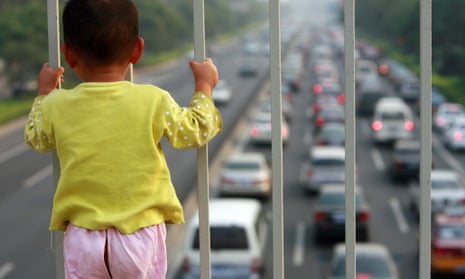Air pollution causes babies to be born smaller, according to a study of babies born just after the Beijing Olympics.
The research surveyed the birth weights of 83,672 babies born in Beijing around the time of the 2008 Olympics, when the government closed down industry, raised vehicle emissions standards, stopped construction and introduced a license plate rotation to slash the number of vehicles on the road.
The massive state intervention created a one-off natural laboratory in which air pollution levels in one of the most choked cities on Earth reduced by between 18% and 59% during the summer of 2008. Birth weights were an average of 23g higher for babies who were in the eight month of pregnancy during the summer of the Games than during the same period in 2007 and 2009.
“These findings not only illustrate one of the many significant health consequences of pollution, but also demonstrate that this phenomenon can be reversed,” said associate professor David Rich, a health scientist from the University of Rochester in the US.
“Even a short term reduction in pollution in a community has a very large public health impact. Some of these babies will have fewer complications or diseases later in life. So any time we can improve or increase birth weight we’re protecting not only the babies when they are born, but also in later life,” he said.
Rich said that when the results were extrapolated beyond Beijing’s smoggy suburbs the total impact of air pollution was massive. “A major percentage of the world’s population lives in environments with pollution levels this high. You could name a lot of those cities in China and India. But this shouldn’t be thought of as only a problem in cites with very high air pollution. Even in cities that have lower pollution we see effects on birth weight.”
Mothers who were between one and seven months pregnant during the Beijing Olympics gave birth to babies of a similar size in all three years studied. Rich said the short period of lower pollution, and these mothers’ subsequent exposure to higher levels before giving birth, did not prove that no positive effect occurred from cleaner air during the early months of pregnancy.
But the study showed that during late pregnancy air pollution was restricting the fastest phase of foetal development. Rich said this was likely due to a restriction of nutrient delivery through the placenta, but the precise reason was unknown.
Air pollution has been identified as one of the biggest environmental health risks facing people worldwide. Long term exposure has been shown to cause millions of deaths.

The new study, published on Tuesday in Environmental Health Perspectives, follows other work that has shown pollution can have an insidious effect even before our lungs have started breathing air.
Jonathan Griggs, a paediatric professor at Queen Mary University of London, said it strengthened this body of evidence. He said that 23g was a small impact on an individual child, but the impact for some vulnerable children would be larger and could push thousands of children in Beijing into a “clinically significant low birth weight” category of below 2.5kg.
“It absolutely does matter because this is showing that dirty air breathed in by mothers can have adverse effects on the developing foetus,” said Griggs.
Children born at a clinically low weight are at greater risk of dying in infancy and are more susceptible to disease. Studies have also linked low birth weight to asthma and decreased lung function in adulthood.
“I wonder, hypothetically, if you told women that drinking bottled water vs tap water would increase their foetus’ growth by on average 23g - would they dismiss this as irrelevant? It should therefore be the right of all pregnant women to have as clean air as possible,” said Griggs.

Comments (…)
Sign in or create your Guardian account to join the discussion